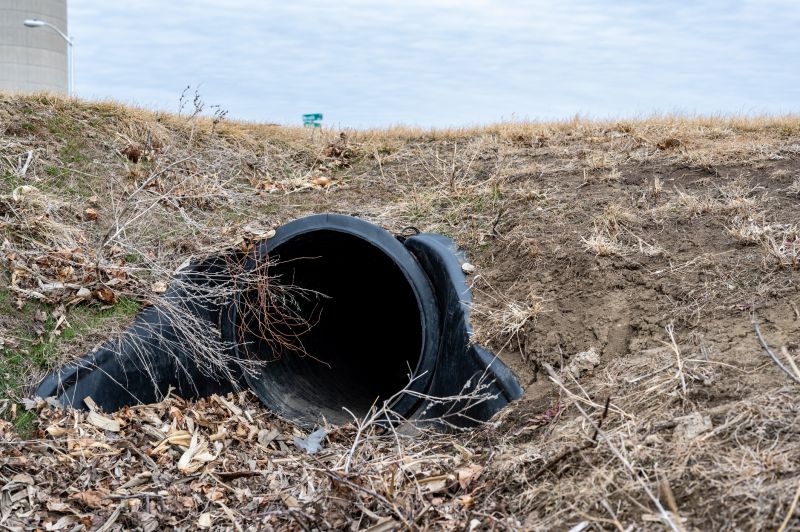Expert Picks For Drainage Service Equipment That Delivers Results
Choose from a curated selection of high-performance products designed to handle various drainage challenges efficiently.
 Effective drainage systems are essential for maintaining the integrity and safety of residential and commercial properties in Charlotte, NC. Proper drainage helps prevent water accumulation, which can lead to foundation issues, erosion, and flooding. When selecting products for drainage service, it is important to consider the specific needs of the property, including the type of terrain, typical water flow, and existing infrastructure. A comprehensive drainage solution often involves a combination of various products designed to direct, control, and manage water runoff efficiently.
Effective drainage systems are essential for maintaining the integrity and safety of residential and commercial properties in Charlotte, NC. Proper drainage helps prevent water accumulation, which can lead to foundation issues, erosion, and flooding. When selecting products for drainage service, it is important to consider the specific needs of the property, including the type of terrain, typical water flow, and existing infrastructure. A comprehensive drainage solution often involves a combination of various products designed to direct, control, and manage water runoff efficiently.
Top Overall Option
Modular Drainage Channel System
A versatile modular drainage channel system offers customizable configurations suitable for various applications, from driveways to garden beds. Made from durable materials, these systems are designed for easy installation and long-term performance, effectively directing surface water runoff away from critical areas. Their adaptability allows property owners to tailor drainage solutions to specific site conditions, making them a practical choice for diverse drainage challenges in Charlotte, NC.
Types of Products For Drainage Service
Underground Drainage Pipes
Used to carry water away from foundations and landscaping, these pipes are available in various diameters and materials to suit different needs.
Channel Drains
Surface-level grates that collect and direct surface water runoff, ideal for driveways, patios, and walkways.
Sump Pumps
Devices installed in basements or crawl spaces to remove accumulated water, helping prevent flooding and water damage.
Gravel and Drainage Aggregate
Used as a base layer to facilitate water flow and prevent soil erosion around drainage systems.
French Drains
Perforated pipes surrounded by gravel or rock to redirect groundwater away from foundations or low-lying areas.
Rainwater Harvesting Systems
Collects and stores rainwater for reuse, reducing runoff and easing drainage load.
Surface Grates and Catch Basins
Protects drainage openings and captures debris, preventing clogs and facilitating water flow.
Downspout Extensions
Redirects roof runoff away from foundations to prevent water infiltration and erosion.
Waterproof Membranes
Applied around foundations and basements to prevent water seepage and protect structural integrity.
Drainage Socks and Filters
Wrap around pipes or in trenches to prevent sediment intrusion and clogging.
Erosion Control Blankets
Stabilize soil and prevent erosion in areas with heavy water flow or construction activity.
Water Diverters
Redirect surface water away from structures or landscaping to prevent pooling and damage.
Popular Choices
Flexible pipes that adapt to various terrain contours, facilitating easy installation and effective water conveyance.
Perforated pipes designed to collect and drain excess groundwater efficiently, often used in French drains.
Durable grates that cover surface drains, helping to prevent debris entry and maintain water flow.
Versatile pumps suitable for various sump applications, capable of handling different flow rates.
Portable bags filled with gravel, useful for temporary or emergency drainage needs.
Devices installed to redirect roof runoff, helping manage water flow and reduce pooling near foundations.
Removable inserts for catch basins that trap debris and facilitate cleaning and maintenance.
Protects slopes and embankments from erosion caused by water runoff, stabilizing soil.
Flexible or rigid extensions that direct roof runoff away from foundations efficiently.
Applied to basement walls to prevent water intrusion and protect structural integrity.
Drainage products come in many forms, each tailored to different scenarios. From underground piping and channel drains to surface grates and sump pumps, the right combination can significantly improve water management. For properties prone to heavy rainfall or poor soil absorption, installing robust drainage systems is a proactive step to mitigate potential water damage. Regular maintenance and proper installation are key to ensuring these systems function as intended over time.
Choosing the appropriate products involves evaluating durability, ease of installation, and compatibility with existing infrastructure. It is advisable to consult with drainage specialists or local professionals familiar with Charlotte's climate and soil conditions. By investing in quality drainage products, property owners can better protect their investments and maintain safe, dry environments. Whether dealing with new construction or upgrading an existing system, the right drainage products can make a notable difference in water management efficiency.
Key Buying Considerations
- Assess the specific drainage needs of your property, including the volume of water runoff and soil type.
- Determine the appropriate product material, such as PVC, concrete, or flexible plastics, based on durability and application.
- Consider the size and capacity of pipes or channels to ensure they can handle expected water flow.
- Evaluate ease of installation, especially if planning a DIY project, and whether professional help is required.
- Check for compatibility with existing drainage infrastructure to ensure seamless integration.
- Prioritize products with good resistance to corrosion, UV exposure, and weathering for long-term performance.
- Think about maintenance requirements, including accessibility for cleaning and debris removal.
- Review local building codes and regulations to ensure compliance with drainage standards.
- Consider the environmental conditions in Charlotte, NC, such as rainfall intensity and soil permeability.
- Opt for products with clear installation instructions and quality assurance to minimize installation errors.
- Evaluate the potential for future expansion or modifications to accommodate changing drainage needs.
- Assess the availability of replacement parts or accessories for ongoing maintenance.
- Determine the budget and compare the cost versus expected longevity and performance of products.
- Look for products with positive user reviews and recommendations from local professionals.
This page contains affiliate links, and we may earn a commission if you make a purchase through them. This helps support our efforts to provide helpful and accurate information.
